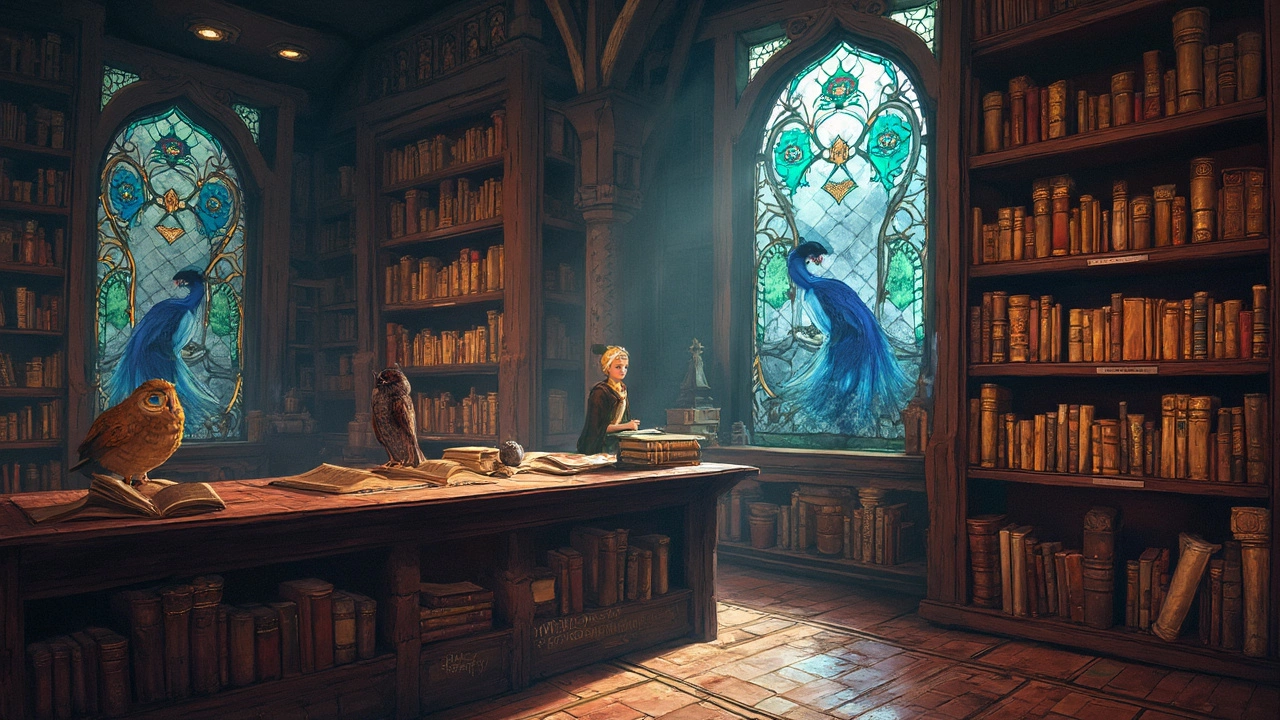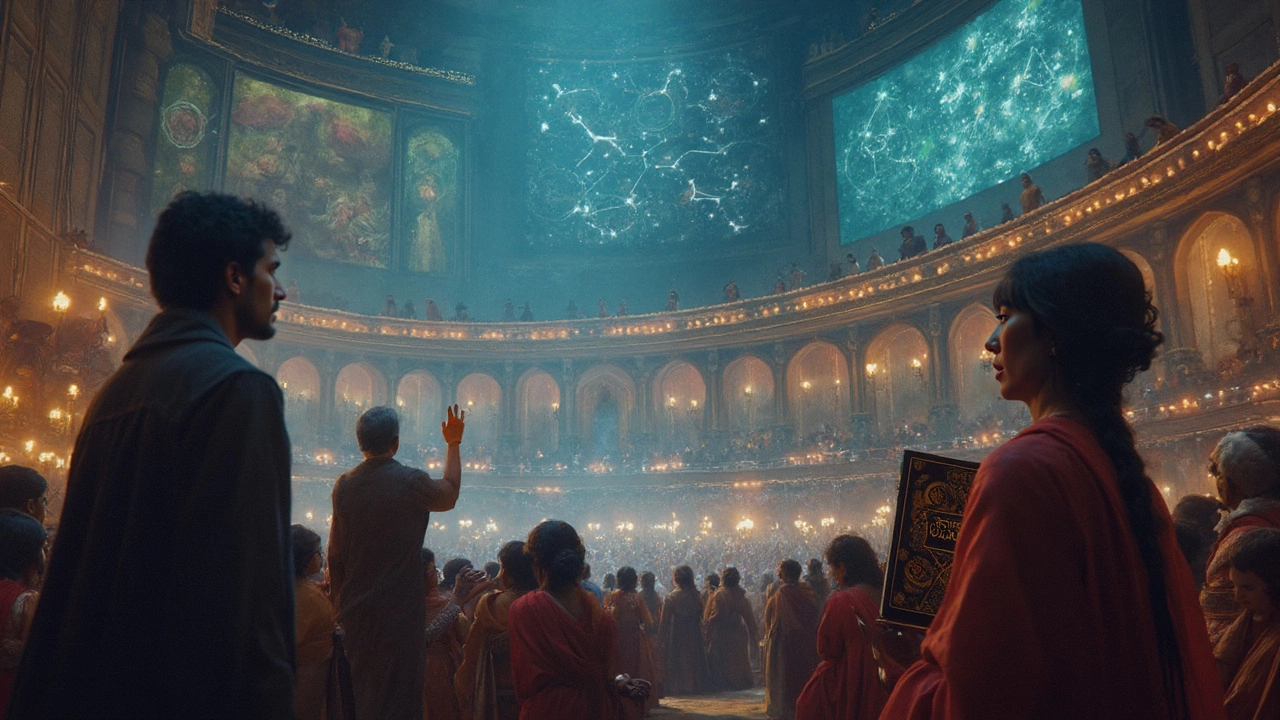
Alright, Harry Potter – the magical world we've all heard about or experienced in one way or another. Now, here’s a question: is Harry Potter science fiction? Given its wizardry and spellbinding escapades, one might wonder.
Science fiction usually ties into technology and the realm of the possible, portraying futures based on scientific advancements. Think spaceships and time travel – stuff bound by scientific theories or extrapolations. With Harry Potter, we're diving straight into a world of pure magic – wands, flying broomsticks, mythical creatures, and spells taught at Hogwarts School of Witchcraft and Wizardry.
This magical universe is deeply rooted in fantasy and myth. Unlike science fiction, which often pushes the boundaries of scientific speculation, Harry Potter revels in timeless mythical lore. It's more about unraveling the mysteries of enchanted landscapes than exploring possibilities of human innovation.
- Defining Science Fiction
- Harry Potter's Magical Universe
- Fantasy vs. Science Fiction
- Mythological Elements in Harry Potter
- What Makes a Story Science Fiction?
- Harry Potter's Unique Blend
Defining Science Fiction
Diving into the world of science fiction, it's good to get a handle on what this genre is really all about. The core of science fiction usually revolves around speculative ideas that stretch beyond the boundaries of current scientific understanding and technology.
A major hallmark of science fiction is its base in science or futuristic technology. We're talking about everything from space explorations and advanced AI to mind-bending concepts like time travel and alternate realities. The best science fiction tales engage our imagination with a mix of the plausible and improbable.
Key Elements of Science Fiction
So, what makes a story unmistakably science fiction? Here's a quick rundown:
- Technology: The presence of futuristic gadgets and machinery.
- Scientific Accuracy: While not always realistic, they often have roots in real scientific theories.
- Extraterrestrial Life: Aliens or life forms from other planets frequently pop up.
- Alternative Timelines: Imagining worlds where events took a different turn.
- Societal Commentary: Offering insights or critiques of contemporary issues through a futuristic lens.
"The only way of discovering the limits of the possible is to venture a little way past them into the impossible." — Arthur C. Clarke
Authors like H.G. Wells and Isaac Asimov were masters of weaving intricate tales rooted in the potential of science and technology. Wells's "The War of the Worlds," published way back in 1898, threw readers into an enthralling narrative about alien invasions – a top-notch science fiction theme.
In today's world, science fiction often explores the implications of modern-day advancements, such as AI and genetic engineering, pushing us to think about the ethical, societal, and existential questions these raise. It's a genre that challenges the mind, inviting us to ponder the marvels and potential pitfalls that science could unleash.
Harry Potter's Magical Universe
It's no secret that the world of Harry Potter is filled with enchantment and wonder. Let's take a closer look at its unique aspects. This universe is rich with elements and characters straight out of myth and legend, making it a cornerstone of the fantasy genre.
The Art of Magic
Magic in Harry Potter isn't just a fancy gimmick—it's the essence of life for witches and wizards. From the very start, wands play a crucial role in casting spells like 'Expelliarmus' and 'Expecto Patronum'. These aren't just fun words; they're tools of survival in a magical world.
Mythical Creatures and Places
Hogwarts itself stands as a testament to creativity and grandeur. A castle that's not just ancient but alive with moving staircases and mysterious chambers. These settings provide the perfect backdrop for encounters with a range of creatures—like centaurs in the Forbidden Forest and mermaids in the Black Lake.
Rich Backstories and Lore
Every artifact, like the Invisibility Cloak or the Marauder's Map, has a backstory that ties into the larger narrative. These histories add depth, showing that this world was rich long before Harry's arrival. And then there's Voldemort, or He Who Must Not Be Named—a villain with layers of complexity.
The series explores themes like love, sacrifice, and the battle between good and evil, setting it apart from straightforward science fiction. In a nutshell, the Harry Potter universe offers readers an escape into a magical dimension that feels as real as it is fantastical.
Fantasy vs. Science Fiction
When diving into the realms of Harry Potter and its classification, the conversation inevitably leads to comparing fantasy with science fiction. Both are beloved genres, yet they come with unique characteristics and often appeal to different spectrums of imagination.
Defining the Boundaries
Fantasy is all about the impossible. It takes you to magical worlds where anything can happen, whether it's through enchanted forests or spells that defy the laws of physics. Science fiction, on the other hand, grounds itself on the possible. It might venture into future tech or alien species, but it's based on scientific law or what might be achievable with technological advancements.For example, in science fiction, you might find wormholes as a means of interstellar travel—an idea rooted in theoretical physics. But in the Harry Potter world, you can simply apparate from place to place, magic wand in hand, no scientific basis required!
Worlds Built on Different Rules
The rules governing the universe in a science fiction tale are often rigid, driven by logic and the potential evolvement of technology. Even with scenarios like time travel, there's often a focus on plausible mechanisms and the consequences they unchain.Fantasy, especially mythological fiction like Harry Potter, often feels less encumbered by rules - a place where the imagination truly reigns. J.K. Rowling crafted a universe tethered more to centuries of myth and folklore than to any scientific theory.
- Science Fiction Themes: Exploration, innovation, space, time travel, futuristic technology.
- Fantasy Themes: Magic, mythical creatures, ancient lore, enchanted realms.
Overlap and Blurring Lines
That said, the lines can blur. Some works lean into both genres. Consider "Star Wars," often seen as a blend. Still, Harry Potter distinctly nestles into fantasy. Its universe isn't constructed on a bedrock of rationality; it is built on belief and imagination.Interestingly, both genres offer escapism, inviting readers to worlds far different from our own. Whether you prefer casting spells or piloting a spaceship, both genres have shaped storytelling in profound ways.

Mythological Elements in Harry Potter
So, what's the deal with the mythological elements in the Harry Potter series? Let's break it down. J.K. Rowling made sure her magical world had a rich, mythological backdrop that appealed to readers who love ancient tales. The blend of magic with familiar myths adds depth to the storyline and characters.
The Creatures and Beasts
First off, the magical creatures. From the three-headed dog, Fluffy, inspired by Cerberus in Greek mythology, to the majestic hippogriffs and thestrals, these creatures are straight out of legendary texts. Not to forget, Dobby the house-elf is somewhat reflective of the ‘Brownies’ in Scottish folklore, who are known to do chores for humans.
Symbols and Motifs
Then you've got symbols like the Phoenix, represented by Fawkes, who symbolizes rebirth – a theme echoing throughout mythical stories worldwide. Also, the Forbidden Forest, filled with unusual creatures and enchantments, plays a vital role much like mythical forests do in tales from cultures around the world where many secrets are hidden.
Names and Spells
Many spells and names in the series have Latin roots. Take ‘Expecto Patronum’ for instance; it means 'I await a guardian' in Latin. The word 'Voldemort' itself is derived from French, meaning 'flight of death.' These aren’t just fancy words, but stem from historical and mythological backgrounds, adding richness and authenticity to the lore.
The Quest and Hero's Journey
Lastly, the hero’s journey in Harry Potter is a classic mythical narrative. Harry’s progression from an ordinary boy to a hero who saves the wizarding world is akin to the journey of many mythological protagonists who undergo challenges, gain wisdom, and eventually fulfill a destiny.
All these elements showcase why Harry Potter isn’t just an ordinary fantasy tale. It's deeply rooted in myths, providing layers of context and excitement for readers who appreciate a blend of new and old.
What Makes a Story Science Fiction?
So, what exactly turns a tale into science fiction? Well, it usually boils down to two main ingredients: technology or science-based elements that push the boundaries of what we know today.
Central Role of Science
In science fiction, the story’s bread and butter is often its core scientific concept. This could be anything from advanced AI taking over the world to exploring distant galaxies with faster-than-light travel. The science here isn’t just backdrop; it’s front and center, driving the plot and shaping the characters' journey.
Technology and Innovation
The tech in sci-fi is usually way ahead of our current capabilities. Think of concepts like cyborgs, teleportation devices, or futuristic cities brimming with high-tech wonders. The magic here isn't wizardry (sorry, Harry Potter fans), but the marvels of human innovation and how they might just change our world someday.
The What-If Factor
Science fiction thrives on the 'what-if' scenarios. What if we could control time? What if we lived on Mars? These narratives often explore societal impacts, ethical dilemmas, and human nature through futuristic lenses. Science fiction worlds reflect possibilities, inspiring discussions about where we might be headed and the potential consequences.
Quick Look: Science vs. Fantasy
| Element | Science Fiction | Fantasy |
|---|---|---|
| Foundation | Scientific Concepts | Magical/Mythical Elements |
| Setting | Futuristic, Technologically Advanced | Medieval, Mythical Lands |
| Common Themes | Space Exploration, AI, Time Travel | Magic, Mythical Beings, Quests |
In a nutshell, while Harry Potter dazzles with its spellbinding adventures, true science fiction revolves around technological wonders that stretch our imagination yet remain grounded in scientific possibility. They're two sides of the imaginative coin – both fascinating, but each with its own distinct charm.
Harry Potter's Unique Blend
When you dive into the world of Harry Potter, it's like taking a detour into a realm where magic and reality seamlessly mingle. This series, penned by J.K. Rowling, isn't strictly about wizards casting spells; it's about a fantastical universe that blends elements from both the fantasy and mythological genres.
What makes Harry Potter so unique is the way it takes ancient mythological influences and sprinkles them into the narrative. Consider the presence of creatures like Hippogriffs and Basilisks, or the use of mythical symbols such as the Philosopher's Stone – each drawn from ancient legend and lore. The series doesn't just invent from scratch but builds upon centuries-old stories, giving them a fresh context in a modern setting.
However, unlike traditional science fiction, which often relies on scientific advancement or futuristic technology, Harry Potter's adventures are anchored in magic. The rules of magic in this universe, while not based on science, are meticulously constructed, providing consistency to the narrative.
Incorporating Modern Reality
Another aspect of the series' unique blend is its setting. While the magical world exists in a parallel space, it's interwoven with the everyday lives of non-magical people, or Muggles. The contrast between the mundane and the magical is striking and adds a layer of depth. The story grounds itself in a recognizable world filled with relatable school experiences, friendships, and challenges.
Magic with a Purpose
The magic in Harry Potter isn't just there to astound or entertain; it has purpose and consequences. Whether it's the use of a Time-Turner to change past events or the moral implications of spells like the unforgivable curses, magic elevates the narrative by introducing ethical dilemmas and complex character developments.
So, in terms of classification, Harry Potter remains firmly in the fantasy corner, with a delightful sprinkle of mythological fiction. It doesn't fit the bill of science fiction because it doesn't rely on scientific laws or futuristic technology, but rather on the rich tapestry of human imagination and mythological ancestry.


